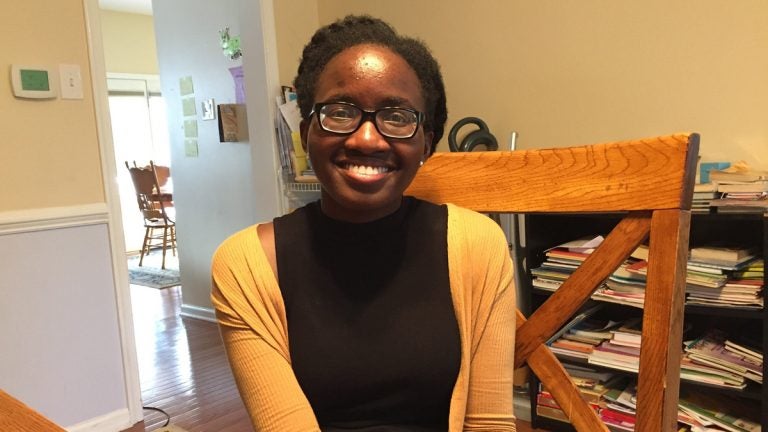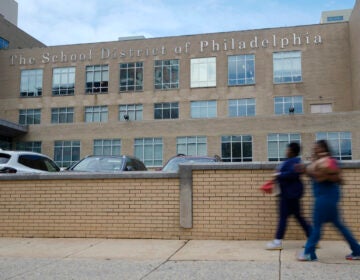Local youth poet honored for work exploring African and African-American identity
Listen
Juliet Lubwama (Avi Wilfman-Arent/WHYY)
So how does a local kid become one of the nation’s top youth poets?
In Juliet Lubwama’s case, the journey started with a Maya Angelou poem she heard in the fourth grade: “Phenomenal Woman.”
Lubwama was transfixed. She rushed home to her bedroom in Downingtown and tried to write her own version of the Angelou piece. She named it “Proclamation of All Things Good.”
From the title alone, you’d figure this fourth grader had some literary potential.
Eight years later, Lubawama, a senior at Downingtown STEM Academy, has been named one of five National Student Poets, the highest honor available to youth poets presenting original work. The prize is jointly administered by the President’s Committee on the Arts and the Humanities (PCAH), the Institute of Museum and Library Services (IMLS), and the nonprofit Alliance for Young Artists & Writers.
Lubwama’s poetry explores the intersection between African and African-American identity. Lubwama’s parents are from Uganda, but she and her siblings were born in the United States and grew up in Downingtown. Her dad, a pharmaceutical researcher, and her mom, a doctor, moved to America for graduate school.
“Through my poetry I come to ask myself where I really am from,” she said. “Do I consider myself to be a Ugandan or a black American?”
In one piece, she describes the Ugandan-American protagonist as a “diphthong” who “begins as one thing and ends in another.” In another poem, “Good Hair,” Lubwama describes how her aunt used to straighten her hair with a hot comb, relating an experience shared by women across the African diaspora.
“Auntie tugs hot comb through hair as if tearing out heritage / rests my head on her knee at a 45 degree angle / as she turns unmanageable, imperfect into adequate / coconut-stained coils into cigarette strands veiled between her fingers.”
Lubwama hopes her poetry speaks to people caught in what she calls “this gray area between their identities.” She knows it’s helped her navigate the African and American influences in her upbringing.
Since she heard Maya Angelou’s poem in fourth grade, Lubwama has spent untold hours in her room futzing with words and verses. Though she aspires to be a doctor someday, she has the unmistakable air of a poet. Even in everyday speech, Lubwama’s sentences have a composed, lyrical quality.
Her love of reading and writing came from her parents, who encouraged her to order books from her elementary school catalog. But even they were a little perplexed by her enduring fascination with poetry.
“They probably think I should get out here,” she said with a laugh.
Turning more serious, she admits it’s not always easy being the type of kid who spends spare time writing poetry and reading about neuroscience (her second love) rather than binging on pop culture.
“I’ve always wanted to be like other kids,” she said. “I mean it’s lonely being alone — to say it quite frankly.”
But that sometimes lonely road — the one less taken, as another poet once said — has led her to the highest heights of her craft. Last week she was feted at the Library of Congress in Washington, D.C. along with the four other National Student Poets.
When she got the call saying she won the award, Lubwama couldn’t believe it.
“I stood there for a while and I was like, are you sure,” she said.
WHYY is your source for fact-based, in-depth journalism and information. As a nonprofit organization, we rely on financial support from readers like you. Please give today.





